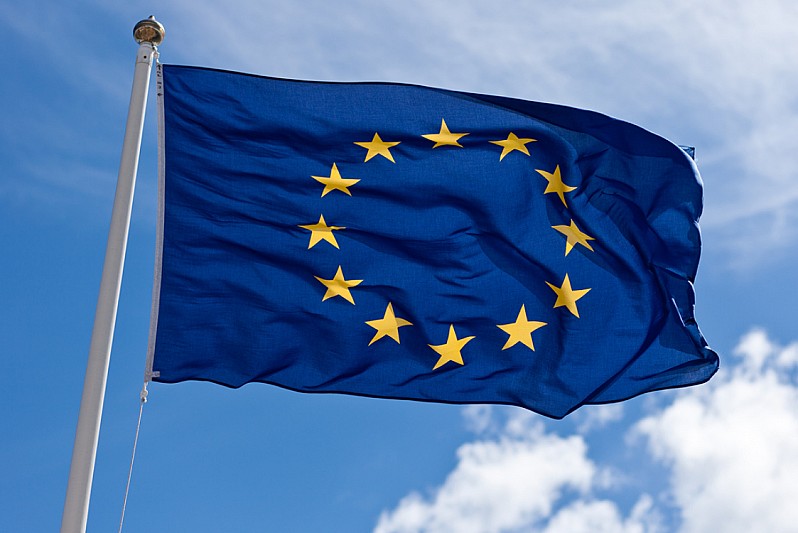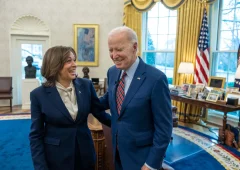Trump’s Crypto Endorsement Could Shake Up European Financial Stability
25.07.2024 18:00 2 min. read Alexander Stefanov
Europe is bracing for potential upheaval as former President Donald Trump prepares to endorse cryptocurrency at an upcoming conference in Nashville.
Scheduled for Thursday, this three-day event will see Trump, who has previously criticized crypto, unveil significant policy proposals for the industry. His support comes as European officials express growing unease about cryptocurrencies, particularly stablecoins.
The European Union has long been wary of digital assets, fearing they could undermine monetary policy and financial stability. Concerns have centered on stablecoins, which are pegged to traditional currencies like the dollar and have been increasingly used in countries with unstable economies.
The EU’s response included the introduction of the Markets in Crypto Assets (MiCA) regulation to impose stricter controls.
Despite these measures, Europe’s defenses may be challenged if the U.S. relaxes regulations under Trump’s influence. Reports suggest that the U.S. could see looser rules for stablecoins, potentially driving a surge in their use. This could result in more dollar-backed stablecoins entering European markets, intensifying concerns over financial stability.
European regulators might struggle to contain the impact, as MiCA does not fully address the challenge posed by dollar-denominated stablecoins. The broader implications could include increased exposure to crypto volatility and potential economic disruptions.
While Europe’s euro remains a robust currency, the rise of crypto, especially under a pro-crypto U.S. administration, poses a growing risk. The possibility of Trump backing initiatives like a Treasury-backed Bitcoin could further complicate the financial landscape, leaving Europe vulnerable to shifts in global crypto markets.
-
1
Billionaire Slams Meme Stock Hype and Sounds Alarm on U.S. Fiscal Health
15.06.2025 18:00 2 min. read -
2
Robert Kiyosaki Predicts 2025 “Super-Crash,” Urges Hoarding Gold, Silver, and Bitcoin
23.06.2025 13:31 2 min. read -
3
Billionaire Investor Sees Dollar Crash If Key Support Breaks
18.06.2025 15:00 1 min. read -
4
Nassim Taleb Says Global Trust Is Shifting from the Dollar to Gold
22.06.2025 17:00 1 min. read -
5
Robert Kiyosaki Predicts When The Price of Silver Will Explode
28.06.2025 16:30 2 min. read
History Shows War Panic Selling Hurts Crypto Traders
Geopolitical conflict rattles markets, but history shows panic selling crypto in response is usually the wrong move.
Robert Kiyosaki Predicts When The Price of Silver Will Explode
Robert Kiyosaki, author of Rich Dad Poor Dad, has issued a bold prediction on silver, calling it the “best asymmetric buy” currently available.
At Least Five Law Firms Target Former Strategy Over Misleading BTC Risk Disclosures
Bitcoin-focused investment firm Strategy Inc. (formerly MicroStrategy) is facing mounting legal pressure as at least five law firms have filed class-action lawsuits over the company’s $6 billion in unrealized Bitcoin losses.
U.S. PCE Inflation Rises for First Time Since February, Fed Rate Cut Likely Delayed
Fresh data on Personal Consumption Expenditures (PCE) — the Federal Reserve’s preferred inflation gauge — shows inflation ticked higher in May, potentially delaying the long-awaited Fed rate cut into September or later.
-
1
Billionaire Slams Meme Stock Hype and Sounds Alarm on U.S. Fiscal Health
15.06.2025 18:00 2 min. read -
2
Robert Kiyosaki Predicts 2025 “Super-Crash,” Urges Hoarding Gold, Silver, and Bitcoin
23.06.2025 13:31 2 min. read -
3
Billionaire Investor Sees Dollar Crash If Key Support Breaks
18.06.2025 15:00 1 min. read -
4
Nassim Taleb Says Global Trust Is Shifting from the Dollar to Gold
22.06.2025 17:00 1 min. read -
5
Robert Kiyosaki Predicts When The Price of Silver Will Explode
28.06.2025 16:30 2 min. read


